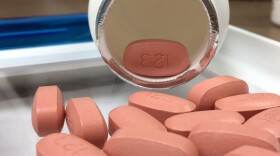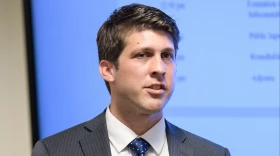The blue, green, and yellow sign marking an entrance to the Florida Wildlife Corridor cannot be seen from the dusty roadway heading into the Fakahatchee Strand Preserve State Park, but the round display featuring a gator, panther, and heron will soon become a familiar sight throughout the state.

The Florida Wildlife Corridor Foundation is working with the Florida Department of Environmental Protection to put up dozens of the signs in coming years.
The colorful markers will indicate both where a section of the corridor can be accessed through a state park, and where it crosses a roadway so drivers know animals as large as a Florida panther or as tiny as an armadillo may soon be in sight.
Kathleen Passidomo, the Republican from Naples who remains president of the Florida Senate until the end of the year, has long been a champion of the corridor.
She was at the strand over the weekend to unveil the new sign and thank the roughly 75 supporters on hand for continuing to spread their message of urgency about acquiring the additional 8 million acres that will complete the ambitious land conservation effort.
“If we did not do this now, then all this beautiful land that we are standing on today, and all this beautiful land in the center of the state, could potentially be developed,” Passidomo said.
The Florida Wildlife Corridor is both a conservation goal and a thing.

The goal of the corridor effort is to continue to raise public awareness of its environmental importance so taxpayers will continue to push decision-makers in Tallahassee to acquire the remaining 8 million acres necessary for an unbroken path from the Everglades to the Florida Panhandle.
The corridor itself, established by the Florida Wildlife Corridor Act in 2021, is currently 10 million acres of nearly interconnected wildlands, farms, and state parks that provide critical habitat for endangered species such as the Florida panther and black bear, as well as protect water supplies, preserve natural Florida, and promote outdoor recreation.
Much of the corridor is composed of 75 state parks, like the Fakahatchee, and national forests and preserves.
At least $300 million a year is to be spent on land for the corridor according to the law passed in 2021 when estimates were up to $6 billion to acquire the remaining 8 million acres. Identifying and purchasing the parcels involves the Florida governor, state Cabinet, and the Florida Department of Environmental Protection.
In some cases, the state buys the land outright. In others, Florida buys a "conservation easement," which gives the state development rights to the land while the owner is allowed to continue to, for example, farm the land.
Earlier this month, Shawn Hamilton, the secretary of the Florida Department of Environmental Protection, resigned amid intense public backlash to a proposal to build golf courses, pickleball courts, and hotels in state parks, which would also mean within the wildlife corridor.

Right after Passidomo’s remarks, a trio of Naples-area outdoor enthusiasts rode mountain bikes past the sign and down the rocky road for a weeklong expedition along the corridor’s Southwest Florida section.
After exploring the Fakahatchee Strand, they were scheduled to hike, bike, and paddle through the Big Cypress National Preserve, the Okaloacoochee Slough State Forest, along the Caloosahatchee River, and finish at Audubon’s Corkscrew Swamp Sanctuary.
Laura Foht, a Naples teacher and mom, was one of the adventurists heading deep into the western Everglades.
"I want to be able to share this experience with my students and my son, and I want them to get excited about being outside and enjoying the wild of Florida,” she said. “It's really important for people to get outside and find those connections to the wilderness.
“I love being out here.”
Environmental reporting for WGCU is funded in part by VoLo Foundation, a non-profit with a mission to accelerate change and global impact by supporting science-based climate solutions, enhancing education, and improving health.
Sign up for WGCU's monthly environmental newsletter, the Green Flash, today.
WGCU is your trusted source for news and information in Southwest Florida. We are a nonprofit public service, and your support is more critical than ever. Keep public media strong and donate now. Thank you.





